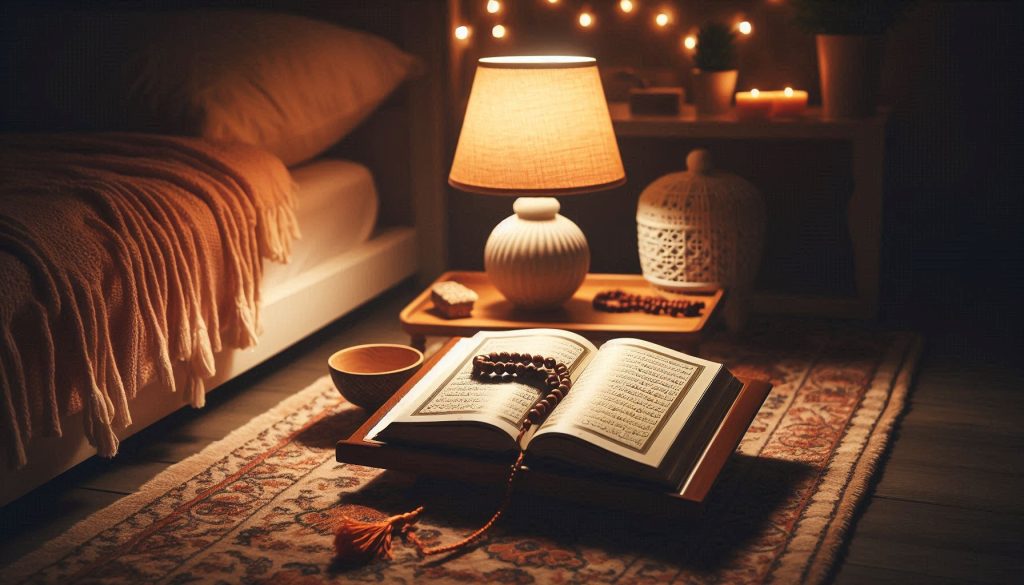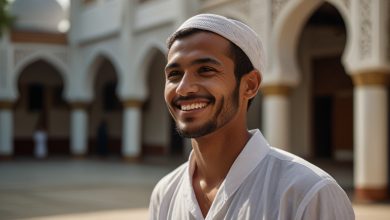Isha Prayer in Islam – The Night Prayer

Introduction
Prayer holds a central place in Islamic life, offering moments of connection with the Divine throughout the day. Among the five obligatory prayers, the Isha prayer in Islam carries a unique significance. As the night wraps the world in stillness, Muslims turn to Isha to conclude their day with spiritual peace and reflection. In this article, we will explore what the Isha prayer is, when it is performed, its structure, and its deep spiritual importance as part of Islamic prayer practices.
What is Isha Prayer?

The Isha prayer is the fifth and final obligatory prayer in a Muslim’s daily worship. Known as the night prayer, Isha marks the completion of the day’s religious duties. It is a time when the world grows quiet, distractions fade, and the heart can turn solely towards Allah (God). Performing Isha signifies a Muslim’s commitment to closing their day in a state of remembrance, gratitude, and submission.
In the traditions of Prophet Muhammad (peace be upon him), great emphasis was placed on performing the Isha prayer, as it embodies faith and patience. After a day filled with work, responsibilities, and worldly engagements, Isha offers a sacred pause — a moment to realign the soul before the journey into sleep.
Time and Conditions for Isha Prayer

Understanding Isha time is important for anyone wanting to observe this prayer correctly. Isha begins after the twilight disappears — that is, once the red glow along the horizon has faded after sunset. This timing ensures that Isha is firmly associated with the true arrival of night.
Islamic scholars generally agree that the time for Isha extends until midnight, which is calculated as halfway between sunset and dawn. However, praying earlier in the night is preferred, especially before going to bed, as it ensures the prayer is not missed.
For those seeking to perform the prayer in congregation, mosques usually announce Isha time based on local astronomical calculations. Always checking local prayer times is essential for accuracy, as Isha time slightly shifts throughout the year.
Number of Rak’ahs in Isha Prayer

The structure of the Isha prayer consists of four rak’ahs (units of prayer) that are obligatory (fard). Alongside the four fard rak’ahs, there are also recommended voluntary prayers (sunnah and nafl) that many Muslims choose to perform to increase their rewards.
A typical structure for Isha prayer could include:
- 4 rak’ahs fard (obligatory)
- 2 rak’ahs sunnah (recommended)
- Optional witr prayer (usually 1, 3, 5, or more rak’ahs)
The witr prayer, while technically separate from Isha, is highly emphasized after Isha as a means of ending the night with an odd-numbered prayer, following the practice of the Prophet (peace be upon him).
By offering the fard rak’ahs and adding the voluntary ones, a Muslim can deepen their spiritual connection, seeking mercy and forgiveness before sleeping.
Importance and Virtues of Isha Prayer

The importance of Isha extends beyond the obligation of daily prayers. The Prophet Muhammad (peace be upon him) highlighted the Isha prayer’s immense spiritual rewards. He said:
“Whoever prays the two cool prayers (Fajr and Isha) will enter Paradise.”
(Sahih al-Bukhari, Sahih Muslim)
The Prophet also mentioned that praying Isha in congregation is like standing in prayer for half the night. This showcases the great virtues attached to the prayer, especially in a time when most people are resting or distracted.
For a practicing Muslim, the Isha prayer reflects dedication and perseverance. After a long, tiring day, choosing to stand before Allah represents a triumph of faith over fatigue. It’s a powerful act of devotion that nurtures the soul and strengthens one’s relationship with the Creator.
Ending the Day with Spiritual Connection
Performing Isha prayer beautifully complements the Islamic philosophy of living each day consciously and ending it with gratitude. The stillness of the night after Isha becomes a sacred opportunity for deeper worship, self-reflection, and heartfelt dua (supplication).
Many Muslims follow the Isha prayer with personal supplications or prayers before sleeping, seeking forgiveness, protection, and blessings. The Prophet Muhammad (peace be upon him) taught several supplications to be said before sleep, fostering a sense of peace and trust in Allah’s care through the night.
Moreover, offering voluntary night prayers, such as Tahajjud, becomes easier when the heart is already tuned to nightly worship through Isha. In this way, the night prayer becomes a bridge, connecting the end of the day with the promise of a spiritually renewed tomorrow.
Isha prayer not only fulfills an obligation but plants seeds of tranquility, reflection, and unwavering faith within the believer’s heart.
Conclusion
The Isha prayer in Islam is far more than a ritual; it is a profound act of spiritual closure. As the final prayer of the day, it invites Muslims to let go of worldly concerns, seek forgiveness, and reconnect with the divine before sleep. Understanding the Isha time, performing the four rak’ahs, and appreciating the virtues attached to this prayer can greatly enrich one’s daily spiritual journey.
In a busy world full of distractions, ending the day with the night prayer helps nurture a calm, centered soul. By prioritizing Isha, Muslims not only fulfill an essential act of worship but also embrace a nightly opportunity to strengthen their bond with Allah, preparing the heart for a peaceful night and a blessed new day.




